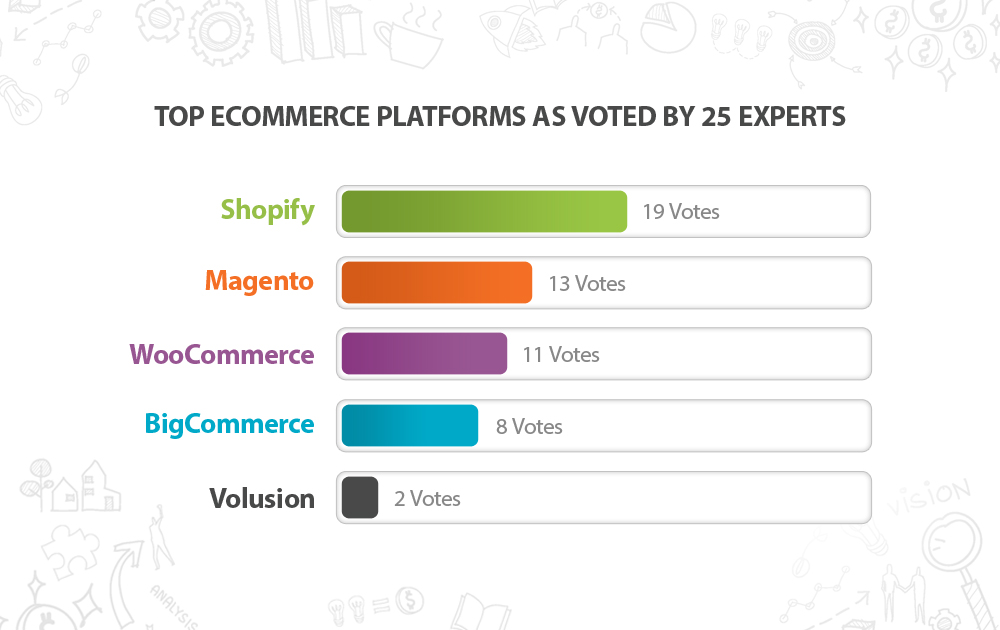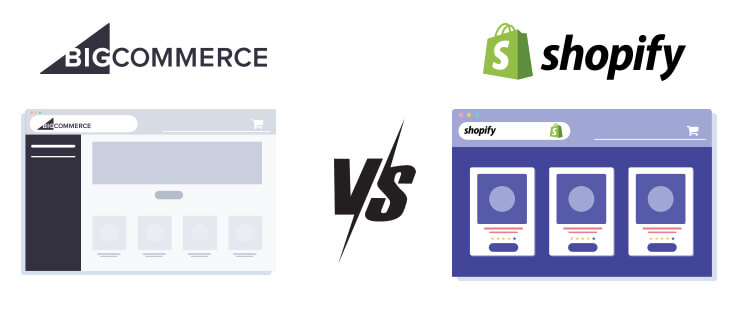
You finally want to migrate to an online store instead of a physical store. But taking the leap into the online world of eCommerce is tricky, as you need to figure out an efficient e-commerce platform that could work for your online store.
With a variety of e-commerce platforms in the market, it is evident that there is no one-size-fits-all eCommerce solution. Each platform boasts of some pros and cons, depending on the feature set and functionality that you are looking for in your website.
We reached out to 25 eCommerce Experts and learned their three best eCommerce Platforms:
Best eCommerce Platforms as voted by 25 eCommerce Experts –

25 Experts share their thoughts on top eCommerce Platforms trending in 2018
Table of Content:
The top three carts I would recommend for independent merchants would be Shopify, WooCommerce and Magento – in that order.
- Shopify is my overall favorite as they’re a hosted solution that eliminates technical headaches while providing you a very robust, customizable cart.
- WooCommerce is ideal if you want to host your own cart and want a lightweight solution.
- And if you need a fully customizable solution (and don’t mind some server and IT overhead) Magento is worth considering”.
The three platforms I’d recommend are Shopify, BigCommerce and WooCommerce.
- For the majority of businesses, I think Shopify has really proven themselves and are leading the pack in terms of innovation, features and the future of ecommerce in general.
- BigCommerce is a great platform as well overall with similar features and functionality to Shopify.
- WooCommerce for WordPress provides you nearly unlimited customizability.
- I’ve always believed that variety is a good thing, and this is particularly true when looking for the right e-commerce platform.
- There are many to choose from and each have their pros and cons based on your unique business – which is one may be right for one business while another may be better for a different business. Among my favorites include Big Commerce, Woo Commerce and Shopify.com
Selecting an eCommerce Platform is a tough task since there are multiple eCommerce platforms available in the market that are good enough in their own right.
Each of these platforms has their own benefits and features that one should consider before choosing the best fit as per their requirement.
- Shopify : Since the last couple of months, Shopify has become the number #1 preferred Hosted eCommerce Solution owing to its host of its features & Community Support.The reason I like Shopify is that you as a store owner don’t need to have any technical Knowledge to keep your site running smoothly – which is a Big Convenience of Store Owners – since you do not need to get in touch with Shopify Developers to make any small or big changes. (Saves time and money both).
- Magento : Magento has been proven to be the best Open Source eCommerce Platform since the last couple of years. If you are looking to build something Big and highly Customised eCommerce Store – Magento Platform can be an excellent choice.Magento Community Edition is completely free software. However, it will require web development knowledge or Skilled Magento Developers to create the Online Store. Magento is a great fit for store owners who are planning to create medium to large eCommerce sites with some customized/specialized features and having a good budget for development & maintenance.
- WooCommerce : WordPress, the most popular open source Content Management System (CMS) allows users to make online shopping cart website using the highly popular WooCommerce plugin.It offers the ease of Shopify to manage store admin and also allow us to customise the source code like Magento to achieve desired features on the store. If you are looking for small to medium size e-commerce store solution, you should take WooCommerce Shopping Cart into consideration.But in my humble opinion, the above three transcend all other e-commerce cart solutions in more ways than one.
- Infusionsoft is a robust automation system that not only includes e-commerce, but email management, automated marketing, sales, and other features as well.
- Shopify is easy to set up and offers numerous features to help you grow your business.
- WooCommerce is one of the most customizable platforms for growing your online business.
There are a lot of good e-commerce solutions available today — many more than in years past.
- For me, I look for a combination of features and ease of use. Both those traits allow me to work quickly, without getting bogged down.
- With all that in mind, my favorites are Shopify, Magento and Six, all of which provide varying degrees of flexibility and ease of use.”
If I had to recommend to someone the top 3 platforms for eCommerce you should try, I would say WordPress, Shopify, and LemonStand (in that order).
- WordPress is currently used by 28% of the entire web. It is completely free to use and the ability to instantly implement eCommerce solutions such as WooCommerce or Easy Digital Downloads make it a quick win.According to BuiltWith, WooCommerce in fact already powers over 41% of all online stores! The customizations within the WordPress platform are almost unlimited, as their repository has over 50,000 plugins which can help extend your website.
- Shopify would be my 2nd recommend as they do one thing and do it well, which is provide eCommerce solutions to business owners. And they have a long history of doing so. They make it quick and easy to launch your store.
- My last recommendation would be LemonStand, which most of you probably haven’t heard of. This is definitely the newest one out there, but if you are just diving into the eCommerce space, this platform makes it about as easy as can be.If you want something that will help you sell products, create a blog, loads fast, and keeps both digital and physical products in mind, you might want to check it out.
Finding an E-Commerce solution that satisfies flexibility in design, friendly user experience and maximizing search engine optimization focal points has been a real challenge for brands we’ve worked with.
- Over the years, we have tapered our list down to one solution that always crushes it with SEO, UX, and elasticity: Cirkuit Commerce. Visit Bobswatches.com to see a website that started from scratch in 2010 and now earns upwards of $20 million per year.The solution offers everything from product feeds for Google Merchant, automatic 301 redirecting, to customizable XML options for efficient indexing by web crawlers.
- If we had to choose two other solutions, they would be Shopify, which is improving many of the SEO limitations it originally came bundled with, and Magento, which will feel like an extension nightmare by the time you’re done setting everything up.The really helpful SEO extensions for Magento require recurring fees, so you’re locking yourself into continuity forever if you go this path. Plan on SEO affecting your ROI, when historically the cost was just labor time.
- Avoid home-grown solutions, which can become vulnerable to security hacks, and could leave you having to rebuild if your developer(s) decide to go elsewhere. Cirkuit Commerce is really the way the go if you want an E-Commerce solution that’s perfect out of the box.
- There are certainly many E commerce platforms available for business owners to choose from in 2017. The single most important step in choosing the correct E commerce platform is to take as much time as you need to do your research on which platform fits your wants, needs and desires best.
- Based on price, ease of use, performance and features here are three E commerce platforms that are the total package, #1 Shopify #2 BigCommerce, and last, but certainly not least is #3 Volusion. Keep in mind that every business is different. Do your research and Happy Selling!
There are many E-Commerce platforms to choose from, but being an SEO expert I have my own reasons for picking the following three.
- WordPress/Woocommerce For small business owners who don’t have thousands of products this is a great platform to work with. Not only is WordPress one of the most SEO friendly platforms on the market, it’s also very easy and simple to use if you are not a designer.It’s simple and easy to use and can integrate with most common payment gateways, with a clean easy to use interface you can add your products, prices, get reviews and anything else that you would expect to see on an E-commerce website. This platform is one I use daily for small E-commerce websites.
- Magento I would tend to go for Magento for a bigger E-Commerce website, again this platform is very SEO friendly, but you are likely to require a developer for this platform to get the site the way you want it. But it’s a much more stable platform for a big online shop and again there are so many add-ons you can get for Magento that this will do anything any other platform does.Again it’s a nice simple to use interface with many online tutorials to help you add your products and get selling online. Just ensure you have a decent server to host this site on as it does use up a lot of memory.
- Shopify is my third choice a great off the shelf platform with FREE templates where you can get your online shop up and running in no time. Very simple and easy to use, even for those with no real design or website experience.Shopify is for those beginners who don’t have a huge budget and want something up and running fairly quickly.
You can integrate with most common payment gateways and its very simple and easy to add your products, and there is no real limit to how many you can add, so Shopify can be used for small or large online shops.
There are a wealth of others to choose from and it really comes down to your own budget and requirements.
I am a great friend of easy solutions, things that just work. That’s why I really like Shopify, WooCommerce and Magento.
- Shopify is huge right now, it is the easiest way for someone to sell anything online. And it is inexpensive. And I believe that a platform that works almost immediately is one of the greatest benefits that a business might have, given that speed and agility are critical when it comes to online and eCommerce business.
- On the other hand, WooCommerce and Magento allow for great customization and flexibility, they are robust platforms, well tested all over the world. These are amazing solutions as long that obviously come with a cost, both financial and in time to the market.
14. Kenny G : [Twitter]
- Woocommerce
- Magento
- BigCommerce
- Shopify for e-commerce sites.
- Lightspeed for POS and ecommerce support.
- We use Shopify and think it is the best ecommerce platform.
20. Lori Wagoner : [Twitter]
- Shopify
- BigCommerce
- Volusion
- PrestaShop
21. Dolores Vela : [Twitter]
- PrestaShop
- Magento
- Shopify
- Woocommerce
22. David J. Neff : [Twitter]
- BigCommerce
- Episerver
- Magento
24. Abel Premnath : [Twitter]
- Sellmojo
- Nwebkart
- Martjack
- I would say it depends on the product and the longevity of the shop. If you want to trial a product use a service.
- If you are thinking long term there is no point in renting a service build your own with a Magento cms or even WordPress.
I know there was a lot of information there, so here are the top 5 eCommerce once again:
If you could only recommend three best eCommerce Platforms to build your eCommerce Store, which three would you choose?
Are there any eCommerce Platforms you are using that weren’t mentioned above?
Let us know in the comments below.


